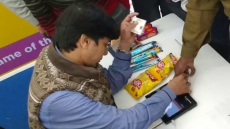Days are not far when people would watch Supreme Court proceedings live sitting in their living rooms as a three-judge Bench headed by Chief Justice of India Dipak Misra on Wednesday allowed a PIL seeking live streaming of the court’s proceedings in important constitutional matters.
To begin with only important cases would be live streamed as suggested by Attorney General KK Venugopal who had submitted a set of guidelines for the purpose.
“We generally agree with the comprehensive guidelines for live streaming of Court proceedings in the Supreme Court suggested by the learned Attorney General for India Shri K.K. Venugopal,” said a Bench of Chief Justice of India Dipak Misra, Justice AM Khanwilkar and Justice DY Chandrachud.
The verdict came on a petition filed by senior advocate Indira Jaising seeking live streaming of court proceedings.
The Bench said, “The project of live streaming of the court proceedings of the Supreme Court on the “internet” and/or on radio and TV through live audio-visual broadcasting/telecasting universally by an official agency, such as Doordarshan, having exclusive telecasting rights and/or official website/mobile application of the Court, must be implemented in a progressive, structured and phased manner, with certain safeguards to ensure that the purpose of live streaming of proceedings is achieved holistically and that it does not interfere with the administration of justice or the dignity and majesty of the Court hearing the matter and/or impinge upon any rights of the litigants or witnesses.
“The entire project will have to be executed in phases, with certain phases containing sub-phases or stages,” it said, adding before the commencement of first phase of the project, formal rules will have to be framed by the court to incorporate the recommendations made by Venugopal.
“Above all, sunlight is the best disinfectant. Live-streaming as an extension of the principle of open courts will ensure that the interface between a court hearing with virtual reality will result in the dissemination of information in the widest possible sense, imparting transparency and accountability to the judicial process,” said Justice Chandrachud in a separate concurring verdict. The first verdict was written by Justice Khanwilkar for himself and the CJI.
The Centre had on August 24 supported live streaming of court proceedings but said it should be introduced as a pilot project in the court of Chief Justice of India and only in Constitution Bench cases.
“The success of this project will determine whether or not live streaming should be introduced in all courts in the Supreme Court and in Courts pan India,” the Attorney General had had said in a written note submitted to the top court.
To ensure that all persons, including litigants, journalists, interns, visitors and lawyers were able to view the live streaming of the proceedings, a media room should be designated in the top court premises with necessary infrastructure and facilities, he suggested.
“This will also ensure that courts are decongested. Provisions may also be made available for the benefit of differently-abled persons,” the AG had submitted.
Venugopal had, however, said live streaming of court proceedings should not be permitted in matrimonial matters, matters involving interests of juveniles or the protection and safety of the private life of the young offenders, cases involving national security.
He said in certain cases it will have to be disallowed to ensure that victims, witnesses or defendants can depose truthfully and without any fear. Special protection must be given to vulnerable or intimidated witnesses. “It may provide for face distortion of the witness if she/he consents to the broadcast anonymously,” he had added.



